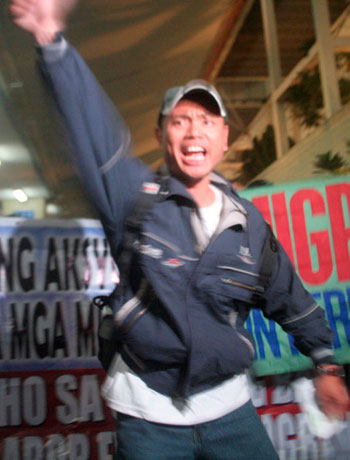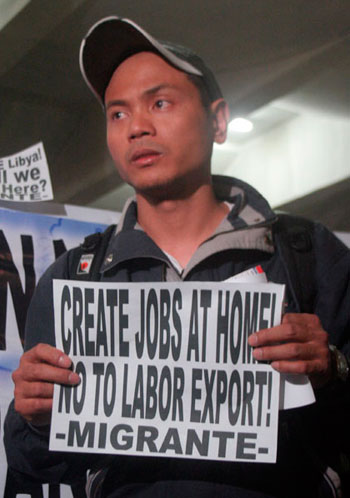By JANESS ANN J. ELLAO
Bulatlat.com
Main Story: Philippines Urged to Protect OFWs as Protests Spread in Middle East
Full Coverage: Anti-government protests in Libya and elsewhere
MANILA – This was not the first time Gil Lebria, 37, had gone abroad for work. Unfortunately, this was also not the first time that he and others like him encountered a major problem that the Philippine government had ignored and, as a result, they were forced to return home earlier than planned, empty-handed.
“I feel terrible because for a while our situation in Libya had seemed better compared to my previous overseas postings,” Lebria told Bulatlat.com in an interview. He is “happy to be home” and to be “far from the trauma and the war” but he was worried and sad for other Filipinos left there to fend for themselves.
Even though Lebria’s overseas career had been unsuccessful from the start, he said he could not help but continue applying for jobs abroad each time he was repatriated. While many would think of him as hardheaded, he reasoned that working abroad is his only way of surviving because a job with decent salary is rare in the Philippines.
A Personal Struggle
Lebria’s first two attempts to apply for a job abroad – first to Australia, then to Taiwan — were both frustrated by illegal recruiters. He spent nearly $2,300 per application only to find out the recruiters were fake. This, he said, saddled his mother with huge debts and, this, in turn, pushed him even more to find work abroad. Debts had to be paid, he said.

Gil Lebria, Migrante International regional coordinator of Libya, returns home. (Photo by Janess Ann J. Ellao / bulatlat.com)
When finally he landed a job as storekeeper in Saudi Arabia in 2000, his employer, unfortunately, did not remit their salaries for a year, forcing the migrant workers, including Lebria, to launch a company-wide strike. In retaliation, the company sent them to prison and, later, back to the Philippines.
Five years later, Lebria applied again and was deployed to Taiwan, where their company, like in Saudi Arabia, did not pay their salaries. On top of being denied their salaries, Lebria and his co-workers were also overcharged with placement fees and forced to agree to a “contract substitution.” They struck to protest this, succeeding in completely paralyzing the company’s operations. This forced their employer to favorably respond to the workers’ concerns but the company singled out Lebria, who had stood as the workers’ leader.
Related story: A Real Life, Modern-day Hero?
His employers tried twice to bribe him, he said, asking him to stop leading protest actions that paralyze the company’s operations. Lebria said the last bribe offered to him amounted to more than a million New Taiwan dollars. When he refused, the company guards abducted Lebria and 15 other overseas Filipino workers on Aug. 2, 2005 and were beaten up minutes before they were forced to take a flight back to Manila.
“I was vomiting blood,” Lebria told Bulatlat.com. It was just his luck that two doctors among the passengers demanded to have him brought to a hospital. Their airplane landed in Hongkong and Lebria was brought into the intensive care facility of St. Princess Margaret Hospital. He eventually returned to Taiwan to complain and file for damages against his former employers. Upon returning to the Philippines, he attended congressional inquiries about their case, which caused the recall of top Philippine diplomats in Taiwan.
After his complaint hearings in Taiwan was done, Lebria applied for work in Kuwait in 2006. This time, he became a coordinator for Migrante International, the largest OFW group. While working for the upliftment of conditions of migrants, the OFW group invariably criticizes the inept services of the Philippine embassy in handling cases of abuses against Filipino migrants in Kuwait.
On Sept. 3, 2008, the company’s project secretary told him that he had been fired. No reason was cited. Migrante-Middle East said they have basis to suspect that Lebria’s dismissal from work was instigated by “those who got furious with (his) exposé and statements” against the Philippine embassy, calling it a an “employment sabotage.”
Related story: Migrant Rights Advocate in Kuwait Illegally Dismissed
Four months later, Lebria applied for work in Qatar. Even before he arrived there, his co-workers had already been asking their company to release their salaries on time. When Lebria arrived, being a natural leader, he spoke in behalf of the migrant workers. He ended up in a fight with his supervisor. He said he only defended himself from his supervisor who had beaten him up.
In Libya
Yet, Lebria still considers his experience in Libya better than what he had gone through before in other places. “It was no ordinary war,” he said. “Everyone, even those in the desert, were affected. We were harassed (by the locals) because they were going hungry and knew that our company has sufficient food supply.”
Lebria went to Libya on April 24, 2010, working as head of the logistics department of a German-owned company. He said that his working conditions, after winning their struggle for their salaries, were relatively better. His salary was about $1,750 a month. But, he said, they had no choice but to move out of Libya when the violent protest actions erupted between supporters and critics of Moammar Gaddafi.
“Everyone (locals) was armed,” Lebria said, adding that if they get killed in the middle of the desert, “How would the embassy know of it?” He managed to contact the Philippine embassy in Libya, which promised them that they would send a vehicle to fetch the Filipinos from their worksite. But when the violence intensified, Lebria said they received a call from embassy officials, telling them they could no longer send vehicles due to security reasons. The Filipinos were instead advised to “remain calm” and to “stay inside their worksites” as they were in a relatively peaceful area compared to other areas.
“But we were not. We were in 100 percent danger,” Lebria said, referring to possible bombing of the oil tank of their company.

Gil Lebria has a history of protesting injustices against OFWs. (Photo by Janess Ann J. Ellao / bulatlat.com)
“Is hunger an indication of safety? Water shortage? Losing contacts with our families? Is that considered as safety?” Lebria said.
On February 24, they left for Tripoli, capital of Libya, aboard a coaster provided by the company. Two days later, they left for Djerba, Tunisia. On March 1, they moved to Malta where they caught a flight back to Manila on March 4.
“If not for our company, all 430 (co-worker) Filipinos would have been dead by now,” Lebria said. He said it was their company who had paid for everything, from their food to hotel accommodation, as they exited Libya via Tunisia and then Malta. Their company also covered all their transportation fees, including their airfare to Manila.
Back home, he said the Overseas Workers Welfare Administration (OWWA) and other government agencies welcomed the OFWs and presented them to the media like some sort of trophy. They were given red caps with the OWWA acronym embroidered on it and they were given a special lane out of the airport.
During his stay in Tunisia, Lebria said that China sent two chartered planes to fetch their nationals. “When we arrived in the boundary, other nationals were welcomed by their diplomats, doctors and nurses. In our case, there was no one,” he said.
“It seems the whole world was alarmed with the violence in Libya, all except the Philippines,” Lebria said.
Future Plans?
Now that Lebria is back in the Philippines, he is attending congressional inquiries regarding the handling of the Department of Foreign Affairs and other government agencies of the repatriation of OFWs from the strife-torn country.
So far, OWWA has offered a one-time cash grant of about $230 to each OFW. But Migrante International said that such program is not sustainable “in the light of the recent spate of price hikes of basic commodities.” The OFW group added that even as the conflict in the Middle Eas rages, the Department of Labor and Employment was already “providing them with options to go back abroad even to conflict-ridden Middle East countries”.
“We are gravely concerned that the Philippine government continues to send our workers abroad when they fail to protect the welfare of our OFWs during critical times,” Martinez said. “But above all, Malacañang has not offered any clear and concrete response.”
“The best economic alternative is to implement genuine agrarian reform program and nationalization of basic industries that would become our local economy’s backbone coupled with a well-planned, pro-people economic structural policy towards the desired economic development,” Migrante-Middle East regional coordinator John Monterona said.
Martinez said that the government should “get their act together and prepare in earnest” for implementing a truly sustainable program” for repatriated OFWs. Migrante-Middle East said that unless the government dropped its “neo-liberal policies of globalization such as liberalization, deregulation and privatization, the Filipino workers’ misery will worsen, pushing them to accept dirty, difficult and dangerous jobs overseas.”
When asked if he has plans to work abroad again, Lebria replied in jest: “Yes. To Afghanistan.” ![]()

No comments:
Post a Comment